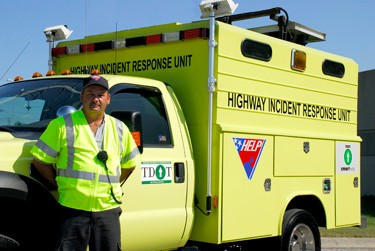How does the HELP Program work?

HELP trucks patrol the most heavily traveled freeways in Knoxville, Chattanooga, Nashville, and Memphis seven days a week. (When requested by law enforcement agencies, HELP trucks may also work on weekends and late at night during special events that create high traffic volumes.)
HELP trucks operate on assigned routes which are restricted to the core areas of each city, so operators can respond quickly to incidents that have the most impact on the total freeway system. The routes sometimes vary by time of day, and HELP trucks are sometimes sent off regular routes to help with traffic control at major incident scenes; but patrols are maintained on the assigned routes as much as possible. For maps showing the normal routes and hours of operation, click here: HELP Routes
The lime-yellow trucks are equipped with a variety of tools, emergency medical equipment, traffic cones, traffic control signs, absorbent material, emergency and work lights, and other equipment to assist with incident management. The trucks also carry gasoline, diesel fuel, and water. The directional arrow boards on top of the trucks can be raised from inside the truck. HELP operators carry two-way radios and cell phones.
All HELP operators are specially trained to deal with different kinds of emergencies that occur on our roadways, and the HELP trucks are official emergency vehicles. You should always yield to a HELP truck just as to other emergency vehicles. Also, you should be aware that HELP trucks make frequent stops. Be especially careful to keep a safe following distance.
HELP services are provided without charge, and HELP operators do not accept tips. Operators give postage-paid comment cards to each motorist who receives assistance, and we encourage motorists to fill out and mail the card as soon as possible after the incident.